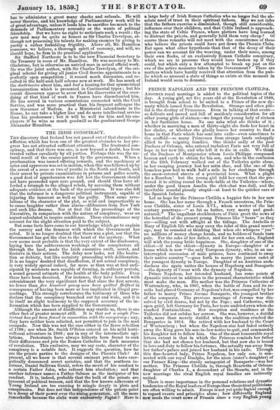THE IRISH CONSPIRACY.
THE discovery that Ireland has not passed out of that chronic dis- affection which has been one of the greatest obstacles to her pro- gress has not attracted sufficient attention. The frustrated con- spiracy, and that there was one, is now beyond a doubt, has been treated rather cavalierly by all parties. Perhaps this was the na- tural result of the course pursued by the government. When a proclamation was issued offering rewards, and the machinery of spies and approvers was set in motion, -when this was followed up by the arrest of a score or two of youths in the North and South, and their arrest by private examinations in prisons and police courts, a good deal of apprehension was felt lest the Government should not have proceeded upon sure a-round, and should thus have af- forded a triumph to the alleged rebels, by accusing them without adequate evidence at the back of the accusation. It was also felt that the informer is a dangerous political instrument, capable of injuring the innocent as well as the guilty. Then came reve- lations of the character of the plot, so wild and impracticable as to cause laughter rather than alarm—filibusters from New York and such like dreams. Nor at first did the proceedings of the Executive in comparison with the nature of conspiracy, wear an aspect calculated to inspire confidence. These circumstances may account for the slight attention paid to the subject.
But some facts have come to our knowledge which go to explain the secrecy and the firmness with which the Government has acted. It is no longer doubted that there was a plot, nor that the Government has got the clue to the heart of the mystery. What now seems most probable is that the very extent of the disclosures, laying bare the subterranean workings of the conspirators all through the land, made the Irish executive swift, secret, and 'decisive in their actions. The delay now looks, not like hesita- tion or dubiety, but like certainty proceeding with deliberation. It is no longer doubted that disaffection, if not actual conspiracy, is very widely spread indeed, far more so than was at first anti- cipated by moderate men capable of forming, in ordinary periods, a sound general estimate of the health of the body politic. Even these have been deceived. For instance, they have learned with astonishment the very significant fact that since the first arrests, no fewer than five hundred young tnen have quitted Belfast in consequence of having been more or less implicated in illegal pro- ceedings. This strongly corroborates the testimony of those who declare that the conspiracy branched out far and wide, and it is in itself no slight testimony to the supposed accuracy of the in- formation which has been supplied to the Government. 'Although the amount of disaffection may startle us, there is one other fact of greater moment still. It is that not a single Pro- testant has yet been found in connection with the conspiracy: nay, they have neither been solicited, nor permitted to join in the mad escapade. Now this was not the case either in the fierce rebellion of 1798; nor when Mr. Smith O'Brien entered on his mild horti- cultural adventure in 1848; nor in any of the intermediate agi- tations. Protestants have always hitherto been found to sink their differences and join the Roman Catholics in dark measures of revolution. This exclusive, may we say caste, character of the conspiracy is a notable fact. It suggests the question, how far are the priests parties to the designs of the Phcenix Club ? At
present, all we know is that several eminent priests have ener- getically denounced secret societies, and that the southern in- former, Daniel Sullivan Gould, refers the merit of his conduct to a certain Father John, who refused him absolution; and that another informer names a Father Salmon as the instigator of his conduct. It is, indeed, probable that the bulk of the priests are innocent of political treason, and that the few known adherents of Young Ireland are too canning to mingle deeply in .plots and conspiracies. But does not this independence of the priests point to a decay of their powei over the rising generation, all the more remarkable because the elnbs were exclusively Papist ? Here is
a large body of Irish Roman Catholics who no longer feel the ab- solute need of trust in their spiritual fathers. May we not infer that the fathers exercise a diminished, though still considerable, influence over their children, and that Celtic Ireland is approach- ing the state of Celtic France, where plotters have long learned to distrust the priests, and generally hold them very cheap ? Of course these remarks will not meet with the concurrence of those who believe the priests could have put down the Phcenix Clubs. But upon what other hypothesis than that of the decay of their power can we account for the weaving, under their noses, among their own flocks, of an exclusively Roman Catholic conspiracy, which we are to presume they would have broken up if they could, but which only a few attempted to break up just on the eve of the active measures taken by the Government? These are matters which have hardly received that attention from the pub- lie which so unusual a state of things as exists at this moment in Ireland would seem to demand.


























 Previous page
Previous page